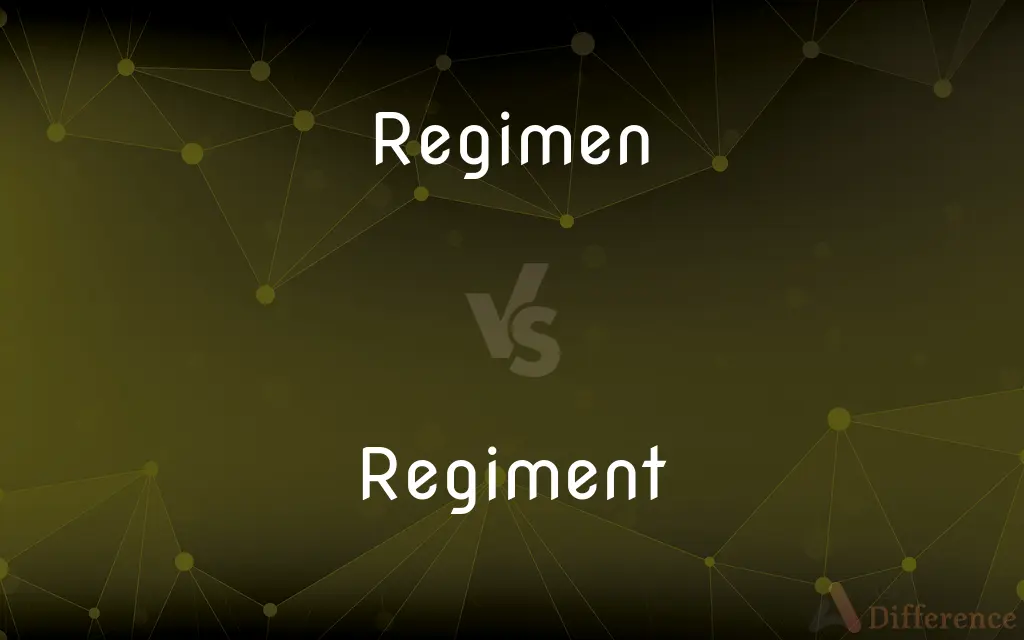Regimen vs. Regiment — What's the Difference?
By Maham Liaqat & Fiza Rafique — Updated on April 14, 2024
A regimen is a systematic plan or set of rules, often for health or medical treatment, while a regiment is a military unit or group.

Difference Between Regimen and Regiment
Table of Contents
ADVERTISEMENT
Key Differences
A regimen refers to a systematic plan or schedule designed to achieve specific outcomes, especially in contexts like health, diet, or therapy. It involves following a structured set of rules or procedures. On the other hand, a regiment is a term primarily used in the military to describe a unit consisting of several battalions, typically commanded by a colonel.
Regimens are often personalized, focusing on individual needs such as a medication schedule or a fitness plan. Whereas, regiments are part of a larger military structure and focus on collective coordination and uniformity among large groups of soldiers.
In terms of application, regimens are usually discussed in medical, fitness, or wellness contexts, aimed at improving or maintaining health. Conversely, regiments are discussed within military or historical contexts, emphasizing their role in defense and tactical operations.
A regimen can vary widely in duration and intensity depending on the specific goals and needs of an individual. In contrast, a regiment is a permanent organizational unit within an army, with specific roles and responsibilities that do not change frequently.
The term "regimen" is derived from Latin, meaning "rule" or "guidance", which reflects its use in guiding health and treatment plans. A "regiment", also from Latin, translates more directly to "rule" or "government", underlining its function in military governance and structure.
ADVERTISEMENT
Comparison Chart
Definition
A systematic plan for health or treatment
A military unit
Context
Health, wellness, therapy
Military
Focus
Individual needs and outcomes
Group coordination and uniformity
Variability
Personalized, can change over time
Fixed, stable structure
Etymology
Latin "regere" (to rule, guide)
Latin "regimen" (rule, government)
Compare with Definitions
Regimen
Personalized to individual needs.
His fitness regimen is tailored to his specific goals and abilities.
Regiment
A military unit, usually consisting of several battalions.
He served in an infantry regiment during the war.
Regimen
A systematic plan or set of rules.
His doctor recommended a new medication regimen to improve his health.
Regiment
Emphasizes uniformity and coordination.
The regiment's disciplined formation was crucial during the parade.
Regimen
Aimed at achieving specific health outcomes.
The skincare regimen was effective in improving her complexion.
Regiment
Part of a larger army structure.
The regiment was deployed to reinforce the division.
Regimen
Can involve various treatments or therapies.
The treatment regimen includes several types of therapies.
Regiment
Involved in tactical and defense operations.
The regiment played a key role in the battle.
Regimen
Often used in reference to health or treatment.
She follows a strict dietary regimen to manage her condition.
Regiment
Commanded typically by a colonel.
The colonel took command of the regiment last year.
Regimen
A regimen is a plan, or course of action such as a diet, exercise or medical treatment. A low-salt diet is a regimen.
Regiment
A regiment is a military unit. Its role and size varies markedly, depending on the country, service and/or a specialisation.
Regimen
A regulated system, as of medication, diet, or exercise, used to promote health or treat illness or injury.
Regiment
A military unit of ground troops consisting of at least two battalions, usually commanded by a colonel.
Regimen
A procedure, program, or routine
A regimen of mathematics seminars.
Regiment
A large group of people.
Regimen
A systematic way of managing something
A crop regimen.
Regiment
To form (troops) into a regiment or regiments.
Regimen
(Archaic) Governmental rule or control.
Regiment
To put (things) into systematic order.
Regimen
Orderly government; system of order; administration.
Regiment
To subject (people) to strict control and rigid order.
Regimen
(medicine) Any regulation or remedy which is intended to produce beneficial effects by gradual operation.
Regiment
(military) A unit of armed troops under the command of an officer, and consisting of several smaller units; now specifically, usually composed of two or more battalions.
Regimen
(grammar) object
Regiment
Rule or governance over a person, place etc.; government, authority.
Regimen
(grammar) A syntactical relation between words, as when one depends on another and is regulated by it in respect to case or mood; government.
Regiment
(obsolete) The state or office of a ruler; rulership.
Regimen
Diet; limitations on the food that one eats, for health reasons.
Regiment
(obsolete) Influence or control exercised by someone or something (especially a planet).
Regimen
Orderly government; system of order; adminisration.
Regiment
(obsolete) A place under a particular rule; a kingdom or domain.
Regimen
Any regulation or remedy which is intended to produce beneficial effects by gradual operation
Regiment
A regimen.
Regimen
A syntactical relation between words, as when one depends on another and is regulated by it in respect to case or mood; government.
Regiment
(transitive) To form soldiers into a regiment.
Regimen
(medicine) a systematic plan for therapy (often including diet)
Regiment
(transitive) To systematize, or put in rigid order.
Regiment
Government; mode of ruling; rule; authority; regimen.
But what are kings, when regiment is gone,But perfect shadows in a sunshine day?
The law of nature doth now require of necessity some kind of regiment.
Regiment
A region or district governed.
Regiment
A body of men, either horse, foot, or artillery, commanded by a colonel, and consisting of a number of companies, usually ten.
Regiment
To form into a regiment or into regiments.
Regiment
To form into classified units or bodies; to systematize according to classes, districts or the like.
The people are organized or regimented into bodies, and special functions are relegated to the several units.
Regiment
To organize and manage in a uniform and rigid manner; to control with a strict discipline.
Regiment
Army unit smaller than a division
Regiment
Subject to rigid discipline, order, and systematization;
Regiment one's children
Regiment
Form (military personnel) into a regiment
Regiment
Assign to a regiment;
Regiment soldiers
Common Curiosities
What is a regiment?
A regiment is a military unit, part of a larger army, typically consisting of several battalions.
Can the terms regimen and regiment be used interchangeably?
No, they refer to different concepts; one is related to health and the other to military structure.
What role does a regiment play in the military?
Regiments perform tactical operations and contribute to the overall strategy and defense efforts of an army.
Who typically follows a regimen?
Individuals seeking to improve or manage specific health conditions often follow a regimen.
What is a regimen?
A regimen is a structured plan or set of guidelines, often related to health or medical treatment.
Is a regimen always medical?
While often medical, regimens can also relate to diet, exercise, or other personal care routines.
How do regimens impact health?
Regimens are designed to manage and improve health by providing systematic care and treatment.
How is a regiment organized?
Regiments are organized into battalions and companies, structured to facilitate effective military operations.
What does it mean to command a regiment?
Commanding a regiment involves leading and managing a military unit, overseeing its operations and personnel.
How large is a regiment?
A regiment typically includes several battalions, with hundreds to thousands of soldiers, depending on the army.
Why is adherence to a regimen important?
Adherence ensures that the planned benefits of the regimen, such as health improvement, are achieved.
Share Your Discovery

Previous Comparison
Plow vs. Plough
Next Comparison
Claimant vs. PlaintiffAuthor Spotlight
Written by
Maham LiaqatCo-written by
Fiza RafiqueFiza Rafique is a skilled content writer at AskDifference.com, where she meticulously refines and enhances written pieces. Drawing from her vast editorial expertise, Fiza ensures clarity, accuracy, and precision in every article. Passionate about language, she continually seeks to elevate the quality of content for readers worldwide.














































